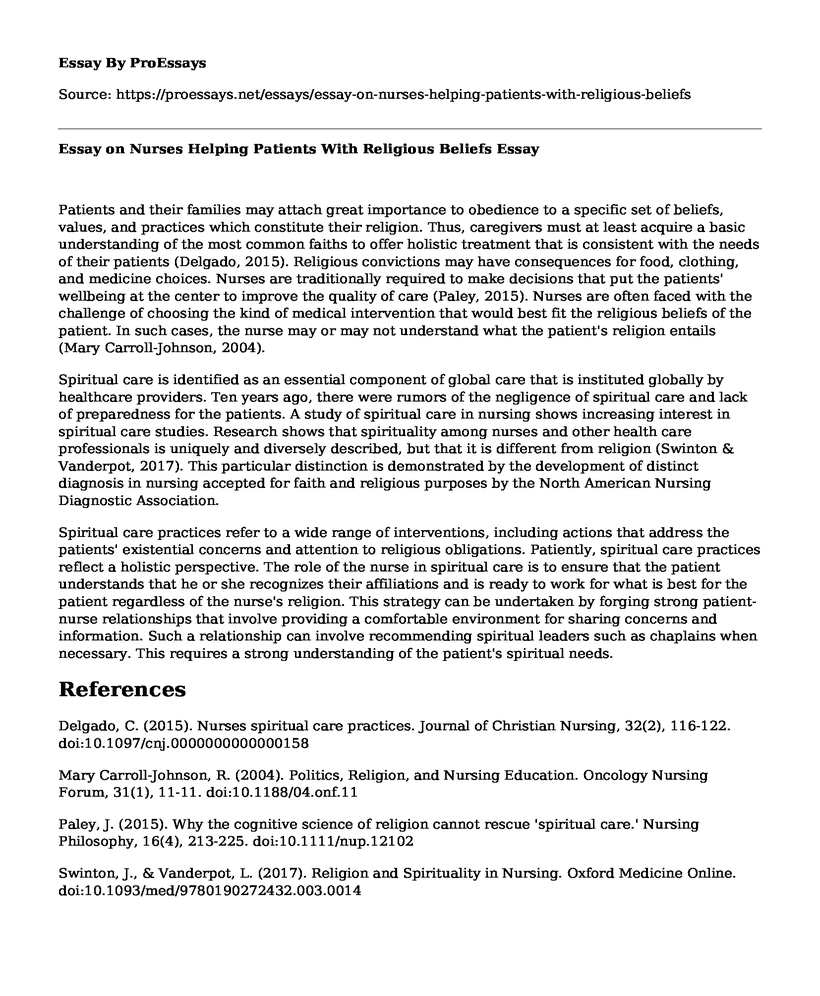Patients and their families may attach great importance to obedience to a specific set of beliefs, values, and practices which constitute their religion. Thus, caregivers must at least acquire a basic understanding of the most common faiths to offer holistic treatment that is consistent with the needs of their patients (Delgado, 2015). Religious convictions may have consequences for food, clothing, and medicine choices. Nurses are traditionally required to make decisions that put the patients' wellbeing at the center to improve the quality of care (Paley, 2015). Nurses are often faced with the challenge of choosing the kind of medical intervention that would best fit the religious beliefs of the patient. In such cases, the nurse may or may not understand what the patient's religion entails (Mary Carroll-Johnson, 2004).
Spiritual care is identified as an essential component of global care that is instituted globally by healthcare providers. Ten years ago, there were rumors of the negligence of spiritual care and lack of preparedness for the patients. A study of spiritual care in nursing shows increasing interest in spiritual care studies. Research shows that spirituality among nurses and other health care professionals is uniquely and diversely described, but that it is different from religion (Swinton & Vanderpot, 2017). This particular distinction is demonstrated by the development of distinct diagnosis in nursing accepted for faith and religious purposes by the North American Nursing Diagnostic Association.
Spiritual care practices refer to a wide range of interventions, including actions that address the patients' existential concerns and attention to religious obligations. Patiently, spiritual care practices reflect a holistic perspective. The role of the nurse in spiritual care is to ensure that the patient understands that he or she recognizes their affiliations and is ready to work for what is best for the patient regardless of the nurse's religion. This strategy can be undertaken by forging strong patient-nurse relationships that involve providing a comfortable environment for sharing concerns and information. Such a relationship can involve recommending spiritual leaders such as chaplains when necessary. This requires a strong understanding of the patient's spiritual needs.
References
Delgado, C. (2015). Nurses spiritual care practices. Journal of Christian Nursing, 32(2), 116-122. doi:10.1097/cnj.0000000000000158
Mary Carroll-Johnson, R. (2004). Politics, Religion, and Nursing Education. Oncology Nursing Forum, 31(1), 11-11. doi:10.1188/04.onf.11
Paley, J. (2015). Why the cognitive science of religion cannot rescue 'spiritual care.' Nursing Philosophy, 16(4), 213-225. doi:10.1111/nup.12102
Swinton, J., & Vanderpot, L. (2017). Religion and Spirituality in Nursing. Oxford Medicine Online. doi:10.1093/med/9780190272432.003.0014
Cite this page
Essay on Nurses Helping Patients With Religious Beliefs. (2023, Mar 02). Retrieved from https://proessays.net/essays/essay-on-nurses-helping-patients-with-religious-beliefs
If you are the original author of this essay and no longer wish to have it published on the ProEssays website, please click below to request its removal:
- Essay on Public Health: Aim for Monitoring and Evaluation of Behavioural and Psychological Symptoms of Dementia
- Research Proposal on Traumatic Brain Injury
- Business Negotiation/Deal Making
- Essay Sample on Psychiatric Mental Health Nursing
- Essay on Understanding Georgia's Poor Health Status: Key Indicators & Impact
- Essay on Footballers and Cancer: Heroes Defying the Odds
- Miss Maria: A Social Worker Interview Revealing the Roles of Direct and Clinical Workers - Essay Sample







